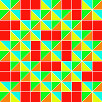Mini Courses---------------------------------------------------------------------------------------------------------------- Computability obstructions in multidimensional symbolic dynamics Mathieu Sablik (U. Aix-Marseille 1 - France) While the theory of one-dimensional subshift of finite type is linked with finite automata, the study in higher dimensions has connections with computability theory. For example, even the basic problem which consist to decide if a subshift of finite type is empty becomes undecidable in dimension 2. During a long time this undecidability appears only as obstructions in the study of dynamical properties but recent results use computability concepts to describe it. Thus local constraints can imply "complex" dynamical properties in the computability setting. This talk explore these recent connexions between dynamical properties and computability concepts.
---------------------------------------------------------------------------------------------------------------- Topological models in holomorphic dynamics Sylvain Bonnot (Universidade de Sao Paulo - Brazil) In this mini-course we will describe topological models for dynamical systems in one and several complex variables. In particular we will focus on the family of the so-called complex Hénon mappings which exhibits a great variety of behaviours. Our goal will be to understand the topological properties of the various attractors that appear naturally in such dynamical systems.
---------------------------------------------------------------------------------------------------------------- Topological and measurable full groups Thierry Giordano (University of Ottawa - Canada)
The notion of full group was introduced by H. Dye in his study of orbit equivalence of measured dynamical systems. It was then extended to the Borel and to the topological case. In this sequence of talks I will review the known results both in the measurable and the Borel case before studying the topological case. To $\phi$ is a minimal homeomorphism of the Cantor set (i.e., $(X,\phi)$ is a Cantor minimal system) is associated two different full groups; the so-called finite full group or topological full group $\[[\phi]] $ and the full group $[\phi]$ .
We will review their main properties and in particular describe the recent new results on the topological full group. |


